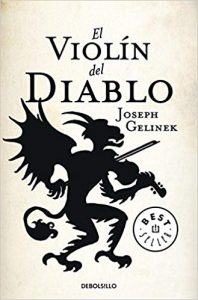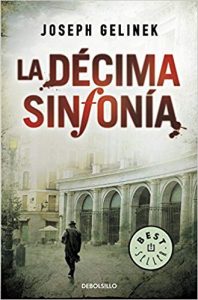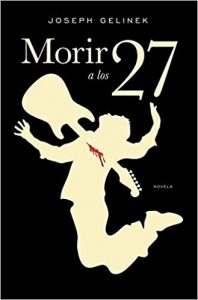When I was preparing to publish my first novel (back in the Pleistocene), I discussed with the editor the possibility of publishing the work under a pseudonym that at that time seemed interesting and suggestive to me. He recommended that I not do it. He was convinced that aliases were only used by people who were well-known enough to decide to hide under that fictional authorship.
Maximum Prairie meets that character profile well-known enough to enjoy that alter-creator game. And in essence, of course, to give a literary outlet to his melomania made leitmotif in all his novelistic proposals.
In fact, Joseph Gelinek's name comes from an Austrian musician which happened with more pain than glory in music, in the shadow of Mozart himself.
And the good man from Pradera has recovered it for the cause of this hybrid between music, mystery and history that composes in his bibliography a suggestive proposal that at times also delves into the fantastic.
Top 3 recommended books of Máximo Pradera
The man who was Sherlock Holmes
With its usual humorous wit, but without neglecting a good gripping plot, the author leads us through a plot every step more delusional or perhaps more and more lucid. Because as Heinreich Heine would say: "True madness may not be anything other than wisdom itself that, tired of discovering the shame of the world, has made the intelligent resolution to go mad."
A torrid morning in July in the center of Madrid. Our protagonist, a doctor who has become a bankrupt homeopath, receives a call from his ex-wife, who makes a surreal proposal: forgive him the months of alimony that he owes him, for the custody of the child they have in common, in exchange for let him house his only brother: a genius chemist in a long depression who has found comfort in the novels of Conan Doyle.
He has become so obsessed with the character that he has come to think that he is the incarnation of the true Sherlock Holmes, as Alonso Quijano believed himself to be Don Quixote. Thus, accepting the ultimatum of his ex-wife - "brother-in-law without pension or pension without brother-in-law?" -, our narrator will be forced to live with the "reincarnation" of the most famous detective of all time and, as a transcript of the chronicler Watson , will follow him in his investigations, accommodating himself to his alienation and breaking the fourth wall with the reader.
The fictional Holmes (the real one being a fictional character himself) will present himself as such. His vast intelligence and his formidable deductive gifts will allow him to impress his "clients" and obtain from them a respectful treatment in the face of his reflections as accurate as they are nineteenth-century.
Devil's fiddle
With that disturbing band of real references, we approach a thematic thriller to enjoy under the notes of an icy symphony of death.
The body of the violinist Ane Larrazábal appears lifeless in the Madrid National Auditorium. His stradivarius has disappeared and theft appears as one of the more than feasible causes.
At least at the beginning, because what cannot be escaped from the police officer Raúl Perdomo is that no one, after a robbery, takes the time to mark the body of the victim.
The word iblis written in blood on the victim's chest points to the same devil who wanted to kill him. It is then when we have to probe more about the last piece performed by the concert artist. Maybe someone ended up succumbing to the notes of the most convoluted work for violin.
Because music is magic to the point of bordering on the paranormal, from that surrender of our emotions, from that surrender of the spiritual... Nothing better than good music so that the devil himself can use it to make us give in to his darkest offerings...
The tenth symphony
Legends always hover over the great ones, extolling them while diving into the dark wells of the mythical. Beethoven could not be less and the darkest legend of him is written on an uncertain staff, the same one in which the single notes of the tenth were recovered.
With the acuteness of the opportunity on such a suggestive subject, Máximo Pradera places us in a current time in which the director Roland Thomas presents in petit committee what amounts to the complete reconstruction of the work.
For Daniel Paniagua, without a doubt, Roland is right and he has managed, in the light or rather to the wonderful waves of music, to get hold of that piece that is always in question. Daniel then turns with all his might to inquire about what may be true in that mysteriously recovered work.
The old myths about the destiny that awaits those who approach this unfinished, initially weaving with improvisation but finally welded this time with the brilliance of incomparable genius.
The shadows that are looming over Daniel end up seeking refuge and help from the authorities. Between all of them they will try to discern the ultimate truth about this strange and magical case.
Other books by Máximo Pradera (or by Joseph Gelinek) ...
Die at 27
When this novel was published, the black legend of singers who died at the age of 27 damned was completed, among others by Kurt Cobain, Janis Joplin, Jimmy Hendrix, Jim Morrison. The following year Amy Winehouse accompanied them at the same age. If the coincidence is not to trigger a novel ...
Under that strange threshold we enter the life of John Winston, leader of a rock band (actually it is a game between middle names and song titles by John Lennon and The Beatles). We also find Chapman as the author of the shot, the famous and macabre reader of The catcher in the rye)
But History seems to have advanced in a parallel world that serves the author to delve into that sinister enigma of the Club of 27. Under the investigation of the inspector Raúl Perdomo we are undoing the particular thread proposed in a labyrinthine plot about the things that should never happen but that fate seems to save for every self-respecting genius to stand out before reaching the fateful age in which the plan is executed.





An insignificant man of whom we still do not know any reason for his arrogance. He writes books that nobody reads and a bland television host and reputable professional insulter who has spoiled the famous saying "Caste comes to greyhound." His grandfather and uncle, brilliant writers, failed to convey their artistic gifts to him, never passing as a willful fool born into a wealthy family. As your grandfather used to say ¡Arriba España!